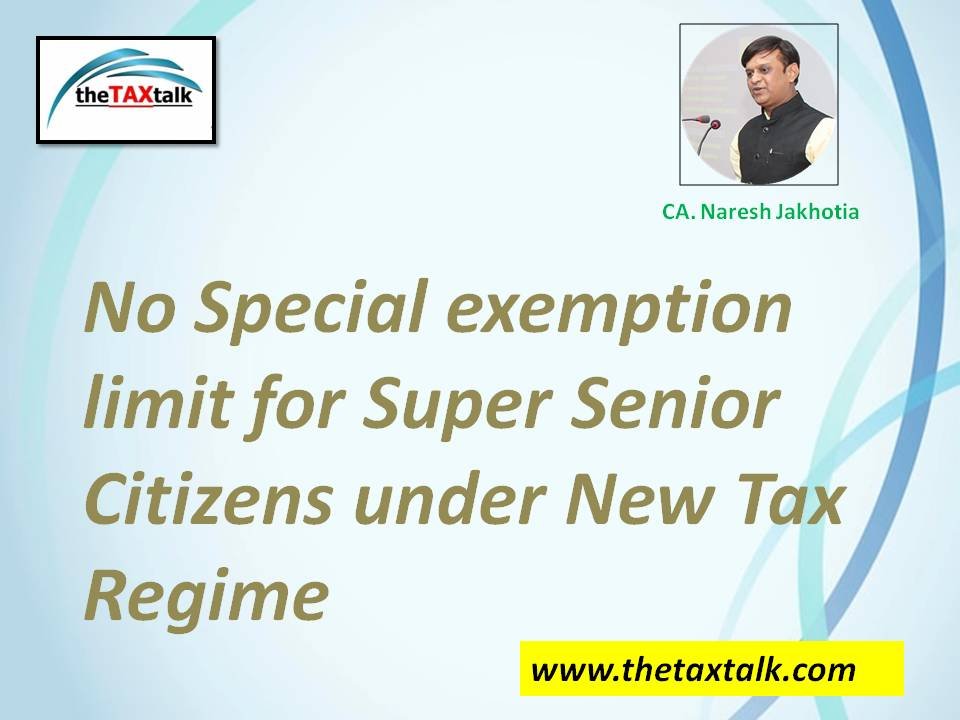![]()
No Special exemption limit for Super Senior Citizens under New Tax Regime
Query 1]
I became 80 years old on 23rd March 2024. Can I file IT return for the FY 2023-24 (Assessment year 2024-25) as a super senior citizen? [Trishnajit Kaur – trishgur@gmail.com]
Query 2]
I am a senior citizen with 67 years of age. I understand that there are a lot of benefits which are available to the senior citizens in Income Tax. Can you please elaborate the tax benefit for senior citizens? Whether I can file the return physically at the income tax office? [Ghansh*******@gmail.com]
Opinion:
After a lifetime of working, raising families, and contributing to the success of this nation in countless other ways, senior citizens deserve to retire with dignity.- Charlie Gonzalez
1.Senior Citizens & Super Senior Citizens:
Any individual who attains the age of 60 years or more at any time during the year is considered as senior citizen under the Income Tax Act-1961. If such persons attain the age of 80 years, they are considered as “Super Senior Citizen”.
For example: Mr. A was born on 31.03.1944, he will be treated as super senior citizen for the FY 2023-24 as he has attained the age of 60 years on 31.03.2024. Even though he becomes a senior citizen or super senior as on the last day of the financial year, he will get all the benefits of being a senior citizen.
1.No Tax Benefit under New Tax Regime (NTR):
It may be noted that the benefit of higher basic exemption limit is available only if the person is opting for the Old Tax Regime (OTR). There is no special favour, benefit or tax treatment for senior citizens under the NTR.
Under the old tax regime, right from the benefit of higher basic exemption limits, there are various other benefits & concessions to the senior citizens. Here is a complete compilation of the benefits available to the senior citizens under the Income Tax Act-1961.
1.a)Higher Exemption limit in tax slabs:
Senior citizens enjoy higher basic exemption. As against the normal basic exemption limit of Rs 2,50,000, senior citizens enjoy the basic exemption limit of Rs 3,00,000/-. The basic exemption limit for super senior citizens is Rs 5,00,000/-. It may be noted that a higher basic exemption limit is available only to resident individuals and not to non-resident senior citizens.
2.b)Exemptions from payment of Advance Tax:
Resident Senior citizens not having any income taxable under the head “Income from Business or Profession” are given immunity from payment of Advance tax. Hence, interest u/s 234B & 234C for non-payment of Advance Tax is not applicable in such cases. It may be noted that there is no immunity for Interest u/s 234A & delay in payment of tax after the due date will attract interest even for senior citizens. Further, immunity from advance tax is not available to non-resident senior citizens and they will be required to pay interest u/s 234B and 234C if payment is not done by way of advance tax.
3.c)Higher deduction on interest income u/s 80TTB:
Resident senior citizens are eligible for deduction up to Rs 50,000 towards interest on saving bank, bank deposits, post office deposit and co-operative society deposit. For other categories of individual taxpayers, it is restricted to Rs 10,000 u/s 80TTA & that too only in respect of interest on saving bank account. Non-resident senior citizens are also eligible for deduction up to Rs. 10,000/- & not Rs. 50,000/-. In short, only resident senior citizens are entitled for additional benefit to the tune of Rs 40,000/-.
4.d)Offline ITR Filing
E-filings of ITR form is not mandatory for Super Senior Citizens. Such super senior citizens can file paper returns provided that they are filing their income tax return in ITR – 1 or ITR -4. [Rule 12 of the Income Tax Rules-1962].
5.e)Deduction towards medical Insurance / Medical Expenditure u/s 80D:
Senior citizens enjoy special recognition u/s 80D which provides for deduction towards medi-claim policy or medical expenditure incurred. The same is as under:
| Medical insurance Status | Deduction for | Age Below 60 year | Age 60 years or above |
|
Medical insurance policy taken |
For Family members |
25,000 | 50,000 |
|
For Parents |
25,000 |
50,000 |
|
| Medical Insurance policy not taken – However medical expenditure incurred | For Family members | – |
50,000 |
|
For Parents |
– |
50,000 |
For senior citizens, premium paid up to Rs 50,000 is available as deduction. Further, if medical insurance is not taken by senior citizens then also deduction can be claimed against medical expenditure incurred subject to maximum ceiling of Rs 50,000/-.
6.f)Additional Deduction U/s 80DDB for specified diseases:
Deduction for medical treatment of specified diseases (like Cancer, AIDS etc) of self and dependent family members is available U/s 80DDB to Resident individuals and HUF.Amount of deduction is as under:
a) For Individual below 60 years of age: Rs 40,000 or actual expenditure incurred, whichever is lower
b) For resident senior citizen (either the assessee or his family member is senior citizen): Rs 1,00,000 or actual expenditure incurred whichever is lower.
Hence in case of senior citizens an additional deduction of Rs 60,000 is available u/s 80DDB.
7.g)No Tax Deduction at Source (TDS) by filing form 15H:
Form No. 15G/15H can be submitted for non-deduction of TDS in respect of following income:
a) Interest Income from banks and financial institution
b) Rental income on property let out for commercial purposes (w.e.f 01.04.2019)
c) Insurance commission (w.e.f 01.06.2017)


